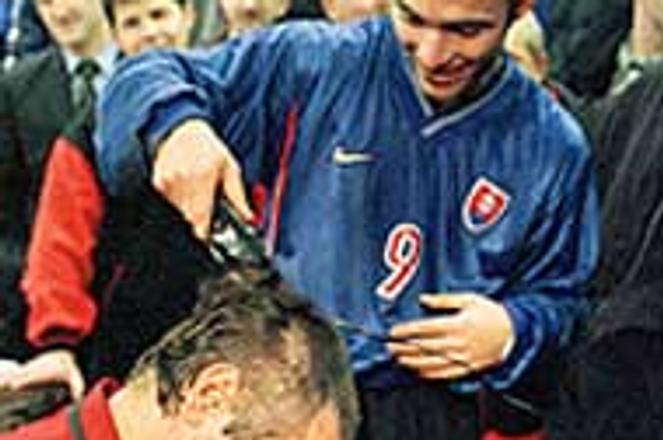Under-21 Coach Dušan Radolský has his head shaved by his players after Slovakia beat Russia 4:1.photo: TASR
MOSCOW: When the Slovak national Under-21 football team drew the strong Russian side in the semifinal round of the European Championships, they knew they would have their work cut out for them. "The Russians are very tough," said František Laurinec, the president of the Slovak Football Association, a day before the first match on November 13. "But I think we can get through them."
To make sure of victory, Slovak Coach Dušan Radolský gave his players extra incentive by promising to let them shave his head if they won an aggregate score victory in a home and away series against the Russians. "I'll die on the pitch just to see my coach's head naked," responded one player.
Coach R is today a very happy - and very bald - coach. The Slovak U-21's beat Russia 4:1 on aggregate, thereby securing a place in the European Championships final round of eight. The victory was lauded in the domestic media as the country's greatest football success in the six year history of independent Slovakia.
Immediately after drawing the Russians, Radolský said that he began working on his team's strategy. The first plan? To supply the players with gloves, stockings, caps and special cleats for hard frozen surfaces - in other words, to be ready for all possible Russian climate conditions.
"I think Russia would like to play on a very smooth pitch, because their style is based on fast, one-touch combinations," he said. "I am sure that even if the weather conditions are very bad, they will do their best to prepare the Dynamo Moscow stadium pitch perfectly because bad weather will be to our advantage."
The November 13 game day brought minus-seven degree weather in Moscow - simply put, it was Russia-cold. Red Square was covered with a thick blanket of snow, but thanks to a typically Soviet style of organisation, 100 men, women, children and soldiers - with the aid of a lot of vodka to protect them from the brutal chill - worked feverishly to clear the pitch. The 535-strong security force also shared in the vodka festivities as they helped keep order in the stadium.
But when the game started, it was the Slovak side which proved the master of the pitch, as the visitors played perhaps better than they ever have. Their efforts were rewarded in the 66th minute when Juraj Czinege broke a 1-1 deadlock with a goal he would later refer to as the biggest of his football career.
"It was absolutely the most important goal in my life," he said after the match. "We were nervous in the beginning, but after 20 minutes we were sure that we could compete with the Russians. In the first half alone we had eight corner kicks and that really made us believe in ourselves."
Despite the disappointing home loss, the Russians didn't give up. Russian Coach Leonid Pachomov said he liked his team's chances in the second leg in Slovakia because the Slovaks had lost the services of four players in Moscow: Eduard Hrnčár to injury, and Miloš Krško, Marián Žiľovský and Peter Banič to card-violation suspensions.
The Slovaks re-tooled. Vratislav Greško, who plays for Bayer Leverkusen of the elite German Bundesliga, Ivan Bartoš from Banská Bystrica and Michal Drahno of Žilina all got the call and played well.
Lending more support to the home side was a raucous crowd of 8,500 Slovaks at Bratislava's ŠKP Devín Stadium. The match was played on November 17 - exactly 10 years to the day that the former Czechoslovak Republic had thrown off its Soviet-puppet rulers. Inspired, the Slovaks again out-classed the Russians.
The pitch was in perfect condition - green and smooth as a billiard table - and the Slovaks rose to the challenge with a tenacious defensive effort, not giving the Russians any room to perform their lethal combinations.
"The Russians cannot play any other style," Coach Radolský said before the game. "They are tactically strong, but they can't get long passes past our defence, nor can they shoot from 20 or 30 meters out."
Expecting the Slovaks to play back on their heels, the Russians seemed unprepared for the attacking style the squad's strikers and midfield employed. The strategy again paid winning dividends as the Slovaks won at home 2-0.
"They expected us to play defensively, but they were wrong," Radolský said after the victory. "We played aggressively, but also patiently and responsibly. We had good match-ups against them and the Russians just couldn't do anything. Of course, the fans really helped us, too."
The players were rewarded handsomely for their victory by the Slovak Football Association, with a five million crown purse and a ten day trip to the Maldives Islands. Radolský assured journalists and fans that the squad would begin preparing for the final round of the European Championships on their return. If they finish in the top four at the tournament, the team will earn an automatic berth to the 2000 Olympic Games in Sydney, Australia.


